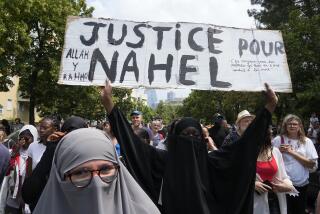Algerians Who Fought and Died for France Still Not Integrated Into French Society : Algerians Fought for France, Still Pariahs
- Share via
JOUQUES, France — In a small graveyard nestled at the foot of this village in southern France, Belkacem Dahak stares proudly out of the photograph on his marble tombstone.
Dahak, who left a wife and 10 children when he died of cancer in 1975 at the age of 44, was a Harki --the Arab name for Algerians who fought in the French army during the seven-year Algerian war of independence.
In this flowered cemetery, where 15 other Muslim tombstones bearing the Islamic crescent lie beside Christian graves, he at last shares the beauty of the surroundings on an equal basis with other Frenchmen.
About 50,000 Harkis and their families were brought to France to avoid reprisals when Algeria finally won independence in 1962.
Today, many are still living in dramatically poor conditions. Unemployment and social rejection have left them bitter.
Nearly 80% of their descendants under the age of 25 are out of work and the Harkis feel more is done for the Algerians who once fought against France--and who now come here as immigrants--than for them.
While enjoying French citizenship, the Harkis , with their Arab names and Muslim religion, are the unwitting victims of the anti-Arab feeling that has increased here, fanned by the rise of Islamic fundamentalism and the Persian Gulf crisis.
“We are rejected by the French as Arabs, and by the Algerians as traitors,” Dahak’s son Hocime, 25, said.
Nearly 30 years after the war, the conflict and the Harkis’ integration remain sensitive topics in France.
On their arrival in France the Harkis were usually put in “temporary” barracks away from or on the edge of towns, reinforcing their isolation.
Often illiterate or lacking employment qualifications, many were given jobs as forestry workers.
“Though we are French citizens, we are only considered French before elections, or when it’s time to do our military service. Otherwise, we are ignored,” Hocime said.
He lives with his mother, brothers and sisters in the “camp” near Jouques, which, with 60 families, is one of the biggest Harki communities in France.
The barracks and apartment building are an eyesore in this beautiful countryside dominated by pine forests, lavender fields and vineyards.
“There certainly is a problem in Jouques,” said Mayor Georges Honorat. “The authorities now recognize that the situation cannot continue. A committee has been formed and funds allocated to resorb the camp in two to three years.”
Successive French governments have tried to deal with the Harki problem, but in the words of Bernard Tricot, the late President Charles de Gaulle’s adviser during the last stages of the war, these efforts have often been clumsy and insufficient.
In August the government adopted another plan to set up training programs, encourage the creation of small businesses, and improve housing conditions for the Harkis.
“However, it’s not always easy to help them,” said Honorat. “We found many of them jobs when the nearby motorway was being built, but after a while they just stopped turning up for work.
“They say they want to leave the camp, but they change their minds when offered the chance to do so.”
“Our parents are too old to move now,” Hocime countered. “They are used to it here. Most of all, we want them to have their dignity back, which means being properly housed where they are.”
Although the Harkis in this region are better off than elsewhere in France, they are still struggling for a place in French society.
“They paid with their blood for the right to be French,” said Tahar Rahal, the regional council’s delegate for Harki affairs here.
“Instead, they are rejected or ignored. Their difficulties have quadrupled with the increase in racial tension in France, and the problems caused by immigration,” he said.
More to Read
Sign up for Essential California
The most important California stories and recommendations in your inbox every morning.
You may occasionally receive promotional content from the Los Angeles Times.












